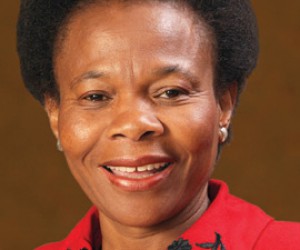"Shale gas exploration in the Karoo, a water scarce region in South Africa, has been given a very conditional green light by the SA government, which has promised to closely assess every move prior to full fracturing to prevent possible “unacceptable outcomes”.
This was revealed by Minister of Mineral Resources Susan Shabangu (pictured) yesterday (Tuesday) when she presented the findings of a report by a governmental task team entitled ‘Investigation of Hydraulic Fracturing in the Karoo Basin of South Africa’, in Parliament. The report was commissioned early in 2011 to evaluate both the possible positive and negative effects of shale gas exploitation. A ban on the exploration of shale gas was lifted last week.
The task team found that shale gas exploitation would hold massive benefits for South Africa’s economy and reduce the country’s reliance on fossil fuels.
Companies which have applied for exploration rights will now be allowed to proceed with the initial stages of exploration until an appropriate regulatory framework has been put in place. This will allow for geological field mapping and other data gathering activities..
Shabangu declined to confirm the names of the applicants, saying the department would need to reconfirm whether all the applicants remained interested.
However, it is wellknown that Shell South Africa has made application to the department. Otherinterested parties are said to be Anglo American, Bundu, Falcon Energy, Chesapeake and Statoil.Actual fracking activities, essential during the later stages of exploration when determining the financial viability of a potential project, will not yet be allowed. towards confirming whether the Karoo indeed held the estimated technically recoverable resource of 485 trillion cubic feet (Tcf) of gas, Shabangu said
The full report will be released soon after editing. But it states that “It is impossible to quantify the resource accurately, other than to say that it is potentially very large. It is essential that additional, modern subsurface information be obtained through drilling or a geophysical survey to constrain these estimates.”
The report said that while exploration right holders conduct their so-called initial activities under the legal framework provided by the Mineral and Petroleum Resources Development Act (MPRDA), a new working committee would work on the establishment of appropriate regulations, controls and co-ordination systems - a process expected to take between six to twelve months.
“Once all the preceding actions have been completed, [government would] authorise hydraulic fracturing under strict supervision of the monitoring committee..In the event of any unacceptable outcomes, the process may be halted.”
There has been outcry by environmentalists, especially in the Cape, against the lifting of the ban and court action has been threatened to have the decision to unban reversed. This is on the back of fears about the impact of shale gas mining on the environment, water use and air pollution.
The report deals with this too.
“The use of hydraulic fracturing in shale gas exploration is perceived to have the attendant risk of polluting sources of drinking water by fracturing fluids and/or methane, and induced seismic events. In the Karoo, there is the additional concern that the volumes of water required may compromise other uses and, in a large part of the area, there is a further geological risk entailed by the presence of extensive intrusions of dolerite and kimberlite, the influences of which are not easily predicted.”
The Departments of Mineral Resources and Science and Technology Will now also have to develop a strategy on how shale gas mining and the recently awarded Square Kilometre Array Radio Telescope project could co-exist in the same environment.






